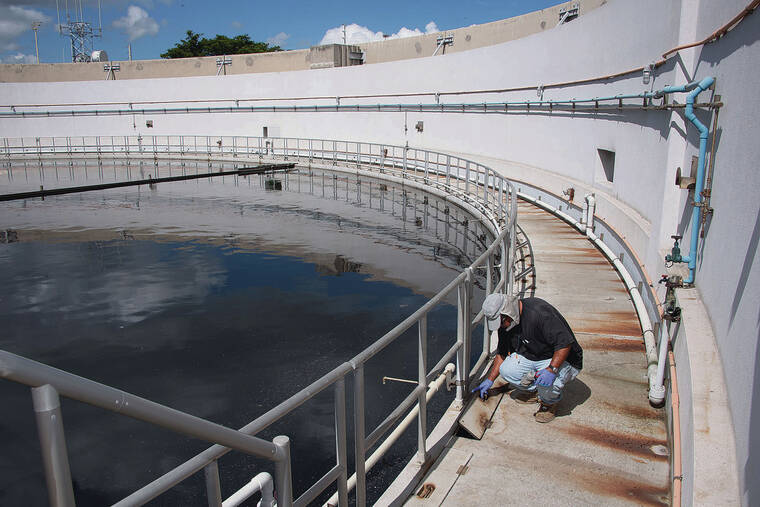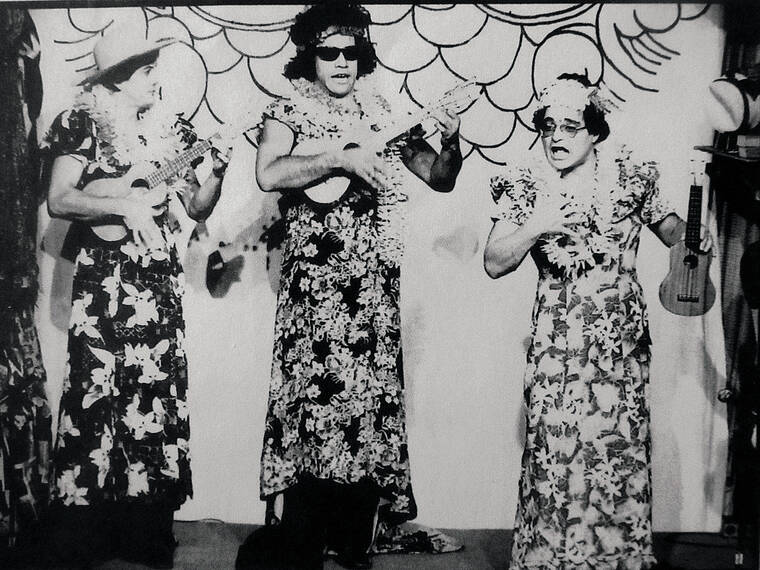City proposing 124% residential sewer fee hikes over the next 10 years on Oahu

CRAIG T. KOJIMA / CKOJIMA@STARADVERTISER.COM
A worker maintained a primary clarifier at the Sand Island Wastewater Treatment Plant on Wednesday.

CRAIG T. KOJIMA / CKOJIMA@STARADVERTISER.COM
The city is proposing a series of increases to sewer fees, which have not been raised since 2016. At left, Mayor Rick Blangiardi spoke about the need for the change. City officials say the hikes are necessary to support ongoing wastewater operations and maintenance efforts as well as improvement projects.

CRAIG T. KOJIMA / CKOJIMA@STARADVERTISER.COM
A worker maintained a primary clarifier at the Sand Island Wastewater Treatment Plant on Wednesday.



A more than 124% sewer fee hike for Honolulu’s average single-family residential customer may be on the horizon, the city administration announced Wednesday.
When all of the city’s rate-paying customers, including commercial users, are compounded, the proposed fee hike amounts to 115% over the decade-long time frame, according to the city.
Starting July 1, the city plans to increase city sewer fees over a 10-year period that will impact single-family residential customers — who consume 9,000 gallons of water a month toward sewer usage, like flushing the toilet — as well as all other customer classes served by the city and county’s sewer system.
Overall, the city’s proposed sewer rate increases will start with a 9% annual adjustment for the first six years, followed by smaller increases of 8%, 7%, 6% and 5% in the final four years, officials said.
Currently, the city says an average single-family residential sewer bill totals approximately $110.89 a month. By July 1, that bill would rise to $122.05 a month.
And by July 2034, the city predicts the average monthly sewer bill will be $248.53 — a 124.1% increase from the current average sewer bill.
Don't miss out on what's happening!
Stay in touch with breaking news, as it happens, conveniently in your email inbox. It's FREE!
City officials say the proposed sewer fee hikes are necessary to support ongoing wastewater operations and maintenance efforts, as well as a $10.1 billion capital improvement program for Oahu’s wastewater collection and treatment system that is planned through 2040.
The fee hikes also will fund projects to prepare the city’s wastewater infrastructure for climate change and sea-level rise, city officials say.
And they assert the work includes a $2.5 billion upgrade to the Sand Island Wastewater Treatment Plant as required under a 2010 federal consent decree.
Still, the Honolulu City Council will have to approve the city’s requested sewer fee hikes before they can be implemented.
To that end, the city intends to present a formal bill package for Council review in November for possible approval by January.
Ian Scheuring, the mayor’s deputy communications director, told the Honolulu Star-Advertiser that the city wanted to present the proposed fee increases before the Council’s annual budget process begins for fiscal year 2026 — work that typically starts with the mayor’s formal city budget submission to the Council in March.
“They need to know before that (budget review) starts, here’s what the rates are going to be so that they can project revenue,” he said. “That’s why they’re going through that process now, so when the budget process starts the rates are set.”
The last time the city raised residential sewer fees was in 2016 — an 8% increase at the time — which goes to self-fund the city’s waste collection system that consists of about 2,100 miles of pipes, 72 wastewater pump stations and associated force mains.
It also collects and treats nearly 100 million gallons of wastewater daily, according to the city.
“It’s important to note that the wastewater (division) — the sewer enterprise, which is the collection system, the pump stations and treatment plants — is a self-sufficient entity,” city Department of Environmental Services Director Roger Babcock said during a news conference at the Sand Island treatment plant Wednesday. “We only receive funds from sewer fees, we can’t receive funds from (the city’s) general fund,” which typically funds city salaries and operational expenses.
“What that means, though, is sewer fees have to match expenditures,” Babcock said. “We haven’t had a fee increase since 2016, that’s 8-1/2 years already.”
He said operational and equipment costs have increased since that time.
“We just can’t wait any longer,” he added. “In addition to that, we need to complete some projects that have been mandated by the federal consent decree that started in 2010 with different parts.”
Babcock noted the last part — to upgrade the Sand Island treatment facility — must be completed by the year 2035.
“That last part is very expensive,” he added, “it’s a $2.5 billion project.”
According to the city, sewer charges consist of two parts, a base charge and a sewer volume charge — which is based on a customer’s water consumption.
Base charges represent the city’s fixed cost associated with operating and maintaining the municipal sewer system, the city said.
According to a city news release, “ENV will be adjusting the basis for how sewer fees are calculated to give customers greater control over the amount of their bill. Sewer bills include a fixed (or base) charge, currently about 70% of the bill, and volumetric charge based on water use, currently about 30% of the bill.”
“Over the next four years, these percentages will gradually shift to a 50/50, fixed-to-volumetric ratio,” the news release states. “This shift to a greater amount of the fee based upon water usage will allow customers to pay significantly lower fees if they reduce their water use.”
According to Babcock, “If you conserve water, your bill will go up much less, but if you continue to use a lot of water, your bill will go up a lot.”
He added, “This applies to all customers.”
“The customer that uses a little less than 8,000 gallons per month will see the exact 115% overall increase,” Babcock said.
In a written statement, Honolulu Mayor Rick Blangiardi said his administration understands “the financial strain that these rate increases may cause for our residents.”
“But these adjustments are critical for the long-term sustainability of our island’s wastewater system,” the mayor said. “By investing in these infrastructure upgrades today, we are safeguarding public health, protecting our environment, and ensuring that Oahu is prepared for the future challenges of climate change. These improvements are essential for our community’s well-being.”
To help offset the impact on low-income households, ENV will launch its so-called Customer Assistance for Residential Environmental Services, or CARES, program, the city said.
Households earning less than 80% of the area median income — which in 2024 is $111,360 for a four-person family — may qualify for a monthly credit of $20 to $25 on their fixed sewer charge, the city said.
Meanwhile, potable water fee rates will not be adjusted, as they are separate fees administered by the Honolulu Board of Water Supply.
In November 2023, BWS adopted a more than 50% water rate hike for a majority of its Oahu customers over a phased, 5-1/2-year rate schedule that runs through fiscal year 2029.




